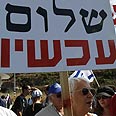
Bill: Limit Left's High Court petitions
New proposal aimed at restricting left-wing groups' activities says associations may only submit petitions against State together with direct victim, must present donation sums. 'Leftists putting legal system to shame,' explains bill's initiator, Likud MK Danon
The proposal seeks to limit the "public petitioners" – associations and bodies submitting petitions against the State despite not having been directly affected by the discussed case.
Related stories:
The Likud MKs are seeking to limit the associations and create a situation in which they will only be able to petition the High Court of Justice together with the direct victims.
In addition, the public petitioner must be an organization operating in Israel, the petition must be "of a constitutional nature relating to the entire public," and the petitioner must present the total sum of donations received in the three years preceding the petition.

Knesset. Another 'anti-democratic' law? (Photo: Gil Yohanan)
"Left-wing organizations are using the High Court to advance political needs, putting the legal system to shame," Danon argues. He says organizations like Peace Now have been petitioning the court "for no reason and basically harming the rule of law."
The MK is trying to recruit a majority of lawmakers to support the bill before it is discussed by the ministerial committee.
The proposal joins a series of similar bills which have been sending waves through the Knesset – the foreign funding bill, which limits donations from international organizations and foreign countries to Israeli associations, and a bill imposing a 45% taxation rate on all foreign state funding of NGOs.
US against foreign funding bill
US Ambassador to Israel Dan Shapiro met Tuesday with a senior Likud minister and expressed his concern over the foreign funding bill. Shapiro did not specifically ask that the government "bury" the law, but implied that the United States was troubled by the bill and did not approve of it.
Shapiro clarified that should the proposal be adopted, and should his country be asked to present its stand on it, "we will say what we think."
The ambassador expressed his fear that the law would fail to distinguish between social and political organizations. The Israeli minister attempted to ease his fears, promising that the bill's content would be looked into and changed.
Following Prime Minister Benjamin Netanyahu's appeal, the bill is expected to be slightly softened in order to distinguish between aid organizations and political associations.
Other bills related to the Supreme Court have also sparked a row in recent days, and were even condemned by President Shimon Peres: A proposal to change the composition of the Judicial Selection Committee, aimed at paving Judge Asher Grunis' way to the Supreme Court presidency, and a bill calling for a public hearing for all Supreme Court candidates, which Netanyahu has promised to shelve in its current format.
Opposition members protested the fact that while these bills are subject to a swift procedure, other proposals are facing bureaucratic hurdles. The delayed bills include supervising parking prices, a hot meal for every school student, public housing for battered women, and helping deprived families enter the labor market.
- Follow Ynetnews on Facebook and Twitter
- Receive Ynetnews updates directly to your desktop










